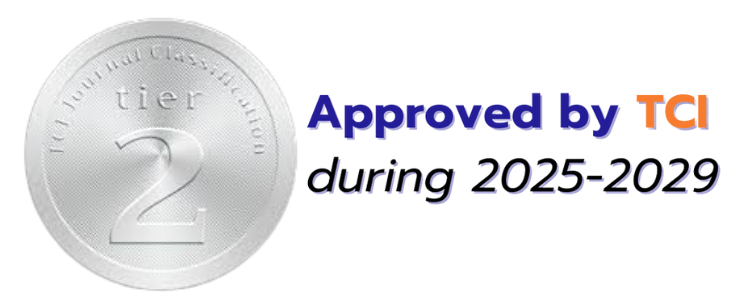การพัฒนาผลสัมฤทธิ์ทางการเรียน วิชาสุขศึกษา เรื่อง สารเสพติด โดยใช้การสอนแบบการใช้ปัญหาเป็นฐาน ของนักเรียนชั้นมัธยมศึกษาปีที่ 2 โรงเรียนเบญจมราชูทิศ ราชบุรี |
The Development of Learning Achievement in Health Education on the Addictive Substances Lesson Using Problem-Based Learning Instruction for Grade 8 Students in Benjamarachutit Ratchaburi School
Keywords:
วิชาสุขศึกษา, สารเสพติด, ผลสัมฤทธิ์ทางการเรียน, การสอนแบบการใช้ปัญหาเป็นฐาน, Health education subject, Addictive Substances, Learning Achievement, Problem-Based Learning InstructionAbstract
การวิจัยนี้มีวัตถุประสงค์ 1) เพื่อพัฒนาและหาประสิทธิภาพของการสอนแบบการใช้ปัญหาเป็นฐาน วิชาสุขศึกษา เรื่อง สารเสพติด ของนักเรียนชั้นมัธยมศึกษาปีที่ 2 2) เพื่อเปรียบเทียบผลสัมฤทธิ์ทางการเรียน วิชาสุขศึกษา เรื่อง สารเสพติด ของนักเรียนชั้นมัธยมศึกษาปีที่ 2 ก่อนและหลังเรียน โดยใช้การสอนแบบการใช้ปัญหาเป็นฐาน 3) เพื่อศึกษาความพึงพอใจต่อการสอนแบบการใช้ปัญหาเป็นฐาน วิชาสุขศึกษา เรื่อง สารเสพติด ของนักเรียนชั้นมัธยมศึกษาปีที่ 2 กลุ่มตัวอย่าง คือ นักเรียนชั้นมัธยมศึกษาปีที่ 2 ห้อง 3 ภาคเรียนที่ 2 ปีการศึกษา 2561 โรงเรียนเบญจมราชูทิศ ราชบุรี จำนวนทั้งหมด 30 คน ได้มาจากการเลือกกลุ่มตัวอย่างแบบเจาะจง เครื่องมือที่ใช้วิจัย ได้แก่ 1) แผนการจัดการเรียนรู้แบบการใช้ปัญหาเป็นฐาน เรื่อง สารเสพติด 2) แบบทดสอบเรื่อง สารเสพติด และ 3) แบบสอบถามความพึงพอใจต่อการสอนแบบการใช้ปัญหาเป็นฐาน รูปแบบที่ใช้วิจัย คือ การวิจัยเชิงกึ่งทดลอง แบบกลุ่มเดียวทำการทดสอบก่อนและหลังการทดลอง การวิเคราะห์ข้อมูลโดยใช้ค่าร้อยละ ค่าเฉลี่ย ค่าส่วนเบี่ยงเบนมาตรฐาน การทดสอบค่าที แบบการทดสอบกลุ่มเดียววัดผลก่อนเรียนและหลังเรียน
ผลการวิจัยพบว่า 1) ประสิทธิภาพของการสอนแบบการใช้ปัญหาเป็นฐาน วิชาสุขศึกษา เรื่อง สารเสพติด ของนักเรียนชั้นมัธยมศึกษาปีที่ 2 พบว่าคะแนนระหว่างเรียน มีคะแนนเฉลี่ยเท่ากับ 16.33 คิดเป็นร้อยละ 81.67 และคะแนนวัดผลสัมฤทธิ์ทางการเรียนหลังเรียน มีคะแนนเฉลี่ยเท่ากับ 16.17 คิดเป็นร้อยละ 80.83 ซึ่งสูงกว่าเกณฑ์ 80/80 2) ผลสัมฤทธิ์ทางการเรียนก่อนเรียนและหลังเรียน วิชาสุขศึกษา เรื่อง สารเสพติด ของนักเรียนชั้นมัธยมศึกษาปีที่ 2 โดยใช้การสอนแบบการใช้ปัญหาเป็นฐาน พบว่าคะแนนเฉลี่ยหลังเรียน 16.17 สูงกว่า คะแนนเฉลี่ยก่อนเรียน 10.23 อย่างมีนัยสำคัญทางสถิติที่ระดับ .05 3) ความพึงพอของนักเรียนชั้นมัธยมศึกษาปีที่ 2 ต่อการสอนแบบการใช้ปัญหาเป็นฐาน วิชาสุขศึกษา เรื่องสารเสพติด อยู่ในระดับมาก (4.47)
The purposes of this research were 1) to develop and finding efficiency of Problem-Based Learning instruction in health education subject on the addictive substances lesson for grade 8 students, 2) to compare the learning achievement in health education subject on the addictive substances lesson of the students those studied through Problem-Based Learning instruction between before and after learning, and 3) to study the students’ satisfaction with Problem-Based Learning instruction in health education subject on the addictive substances lesson. The sample group consisted of 30 grade 8 students in Benjamarachutit Ratchaburi School, during the second semester of the 2018 academic year, who were selected a purposive sampling. The research instruments were composed of lesson plan, a test of learning achievement on addictive substances lesson, and questionnaire about satisfaction toward Problem-Based Learning instruction on the addictive substances lesson. The research design was the One-Group Pretest-Posttest research. The data were analyzed by percentage, mean, standard deviation and t-test.
The research findings were 1) the efficiency of Problem-Based Learning instruction on the addictive substances lesson for grade 8 students during the lesson scored 81.67 percent (mean score = 16.33) and learning achievement after the lesson scored 80.83 percent (mean score = 16.17) which met higher the standard criteria of 80/80, 2) after learning the students who were taught by using Problem-Based Learning instruction gained learning achievement mean score (mean score = 16.17, S.D. = 2.445) higher than before (mean score = 10.23, S.D. = 1.416) at the .05 level of significance, and 3) the students’ satisfaction towards Problem-Based Learning instruction on the addictive substances lesson for grade 8 students, as a whole, was at the high level (mean = 4.47, S.D. = 0.68.)







